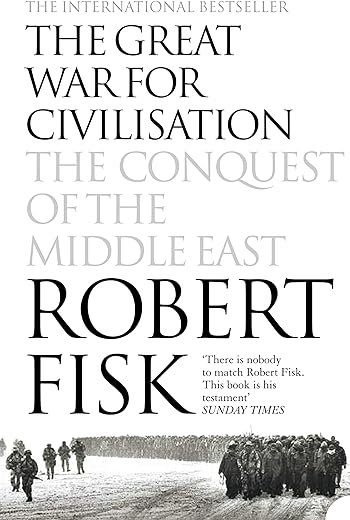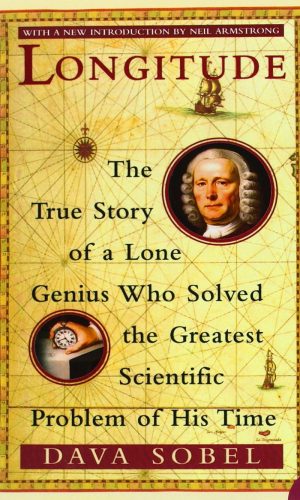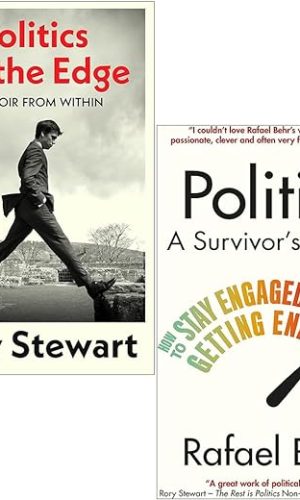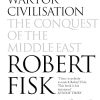The Great War for Civilisation: The Conquest of the Middle East
£16.70£18.00 (-7%)
Robert Fisk’s bestselling eyewitness account of the events that have shaped the Middle East is alive with vivid reporting and incisive historical analysis.
The history of the Middle East is an epic story of tragedy, betrayal and world-shaking events. It is a story that Robert Fisk has been reporting for over thirty years. His masterful narrative spans the most volatile regions of the Middle East, chronicling with both rage and compassion the death by deceit of tens of thousands of Muslims, Christians and Jews.
Robert Fisk’s remarkable history is also the tale of a journalist at war – learning of the 9/11 attacks while aboard a passenger jet, reporting from a bombed-out Baghdad, interviewing Osama bin Laden – and of the courage and frustration of a life spent writing the first draft of history.
Read more
Additional information
| Publisher | 1st edition (2 Oct. 2006), Harper Perennial |
|---|---|
| Language | English |
| Paperback | 1392 pages |
| ISBN-10 | 1841150088 |
| ISBN-13 | 978-1841150086 |
| Dimensions | 12.9 x 6.8 x 19.8 cm |










by A A
Reading this book is more important now than ever.
So many things stand forgotten in history:
The French massacre of Algerians in 1961 in Paris.
The first holocaust of Armenians in the 20th century.
Brutal invasion of Israel into Lebanon in 1982.
The bullying of NATO members by US politicians to not stray from US’s official path.
How lobbyists influence US Politicians.
How armaments companies benefit from war.
How survivors of holocaust use the same technique of warfare they were once subjected to, upon other refugees.
How lobbyists make media show only one side of history.
How journalists with a conscience have their work redacted.
This is heavy in history but written like a prose.
This read will haunt you.
There are no heroes in history, only victors.
A must read by a generation lest we forget and repeat.
I am so buying the rest of his work.
by Ronald G. Young
Robert Fisk’s massive, thoughtful and humanistic portrayal of the killing fields of the middle east, brought on by the thoughtless and arrogant interventions over the past century of Britain, France and America in such areas we now know as Syria, Israel, Palestine, Iraq and Iran. Its 1300 pages are a modern “War and Peace” – and can be put down only long enough to rest one’s arms from the weight of the book! I’ve tried before to understand the history and events of this area – but the previous books have clinically recited events and dates and referred in a few cliches only to the horror of those events. The only individuals who figure in these other books are the leaders – but this book portrays both the victims of the slaughter and their families and also those in the Western bureaucracies – both private and public – who make the slaughter possible. Their words are closely analysed – and their actions held to account in a relentless way which restores one faith in journalism. The book’s theme of our lack of historical perspective is echoed in a much shorter book first published in 2003 by Karl Meyer – but Fisk’s book is interlaced with powerful references to his father and others who fought in these same places at the beginning of the 20th Century. This is the book which should be required reading for students of government and for those aspiring to leadership – and the subject of discussion at all book clubs. It is writing and humanity at its highest level. Government is about individuals making, or colluding with, decisions – and how rarely do we get this level of research and critical scrutiny of the words individuals use to protect themselves from questions which might challenge the lives they lead.
I too have read his previous book on Lebanon – and disagree with another reviewer’s comparison. This is the more significant book – which needs this detail to balance the countless times the victims are simply written out of history. But yes, perhaps, the chapter on Armenia is overdone – and fails to mention the slaughter by Armenians of Azeris in the 1990s and the displacement by them of 1 million Azeris to tent cities.
by Ulrik Jungersen Walther
This is an enormous book, and covering developments in the wider Middle East from 1915 till the 2003 Coalition invasion of Iraq.
The book doesn’t really cover the whole of that time frame but rather sub-periods within. As such, it consists of seven basic sections: Interviews with Osama bin Laden, the Iran – Iraq War, Afghanistan, Algeria, the Armenian Holocaust, the Palestinian – Israeli conflict and the 91 & 03 wars with Iraq.
The canvas is written as a journalistic fly-on-the-wall account, which means that in order to get the full benefit from Fisk’s writing, it is often advisable to supplement ones reading with a historical perspective. Irrespective of whether you try to develop a historical perspective, it very quickly becomes clear that there is absolutely nothing that ties these seven sections together apart from their geographic proximity, the fact that a lot of people die on each page and a somewhat feeble attempt to try and link each one of them to the participation of Fisk’s father in the last 6 months of World War 1. In fact, there is so little connect between the sections that the book’s publisher should have suggested that each section was published as a separate book in its own right, thereby giving Fisk the opportunity to set the story in a wider historical context. This book does not benefit from being narrowed to a defined time, place or context which hugely benefitted “Pity the Nation”.
The book is also massively long and whole rainforests are wasted on uninteresting and redundant information. You read and read and read and keep on thinking “Come on, Fisky. Get on with it. Where is the story here?” Though far between, the stories are there and some are very good indeed, however they could have been produced much more powerfully on 700 pages rather than 1,300.
There is no doubt that Fisk is a controversial writer. Comments like “Typical Fisk. It is all Israel’s fault” do not do the book justice and are not a fair representation of the book’s message. (Less than 1/3 of the book actually deals with Palestine & Israel) Fisk readily dishes out criticism, where he thinks criticism is due. Arafat and the PLO get as much deserved criticism for its corruption, totalitarianism manipulation as Israel gets for its settlements in Palestine. Fisk’s obsession is not with Israel, but with morality. His world is good or bad. Black or white. He does not have to pay the politician’s price of having to prioritize how bad, bad actually is. That is what makes him interesting and why the world needs people like him. He is a fascinating writer, always worth a read, but “The Great War for Civilisation” is by no stretch his finest hour.